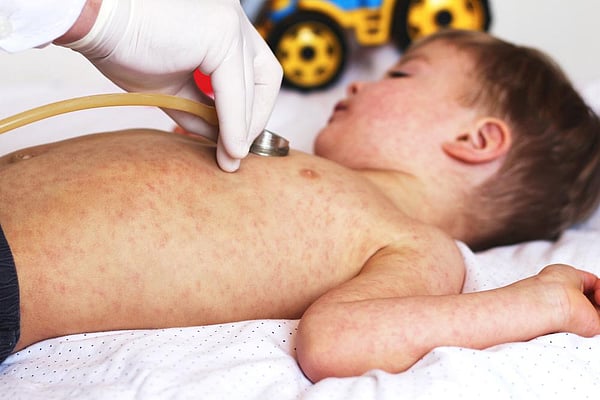Roseola: Symptoms and Treatment

What is Roseola?
Roseola, or roseola infantum, is a fairly mild childhood disease that causes fever and a rash. Sometimes called "baby measles," it typically strikes children between the ages of 6 months and 2 years. It's caused by the human herpes virus 6, a cousin of the viruses that cause cold sores and genital herpes.
What are the symptoms?
Roseola generally starts with a moderate to high fever. Your child's temperature will hover between 101 and 105 degrees for two to five days and then abruptly return to normal. As the fever drops, a rosy-pink spotty rash will appear on your child's torso and sometimes spread to her neck, face, and arms. The rash usually lasts only a day or two. Other symptoms may include a sore throat, irritability, fatigue, a runny nose, mild diarrhea, decreased appetite, and enlarged lymph nodes in the head and neck.
About one in 10 children who have roseola suffer a febrile seizure, or fever convulsion, which can occur with a rapid rise in temperature. If this happens, the child may become unconscious and jerk her arms, legs or face for two or three minutes; she may also lose control of her bladder or bowels. Although frightening, fever convulsions in young children are seldom serious and rarely cause any harm. Even so, you should report a fever seizure to your child's pediatrician right away.
What are my treatment options?
There's no specific treatment for the illness. Make sure your child rests and drinks plenty of liquids. You can give your child acetaminophen to reduce the fever, or ibuprofen elixir; there are infant drops that are labeled for use for children aged 2 to 3. Call your pediatrician for advice on dosages for younger children. (And never give aspirin to anyone under 20; it can cause Reye's syndrome, a rare and potentially life-threatening disease.) Warm sponge baths are also soothing.
When should I call the doctor?
Call your pediatrician or family doctor if your child has a fever of 102 degrees or higher. You should also call the doctor if the fever lasts for more than four days, the rash lasts for more than three days, or if your child has convulsions.
Is roseola contagious?
Yes, particularly among young children. Don't let your child play with other kids until the rash clears up. (A child who is exposed may come down with the illness in a week to ten days.) Most people over the age of 4 have developed an immunity to the virus, even if they haven't had the disease. Even so, make sure all family members -- particularly people taking care of your sick child -- wash their hands frequently.
Further Resources
National Institute of Child Health & Human Development
http://www.nichd.nih.gov/
Pantell, Robert H. M.D., James F. Fries M.D., and Donald M. Vickery M.D. Taking Care of Your Child: A Parent's Illustrated Guide to Complete Medical Care, Eighth Edition. Da Capo Lifelong Books.
References
Pantell, Robert H. M.D., James F. Fries M.D., and Donald M. Vickery M.D. Taking Care of Your Child: A Parent's Illustrated Guide to Complete Medical Care, Eighth Edition. Da Capo Lifelong Books.
U.S. National Library of Medicine, National Institutes of Health. Roseola.
Mayo Clinic. Roseola. http://www.mayoclinic.com/health/roseola/DS00452/
Related Posts
Junk Food Ads Reaching Kids Through Livestream Gaming Platforms
THURSDAY, Dec. 16, 2021 (HealthDay News) -- Children and teens who use...
Sugar-Sweetened Drinks Linked to Increased Incidence of Liver Cancer, Mortality
TUESDAY, Aug. 8, 2023 (HealthDay News) -- Intake of sugar-sweetened beverages is...
¿Un ‘desequilibrio químico’ en el cerebro provoca la depresión? Tal vez no
MARTES, 9 de agosto de 2022 (HealthDay News) -- La idea de que la depresión es...
Light Exposure Before Nightshift Cuts Fatigue, Errors
FRIDAY, May 12, 2023 (HealthDay News) -- Exposing nurses working nights to light...
